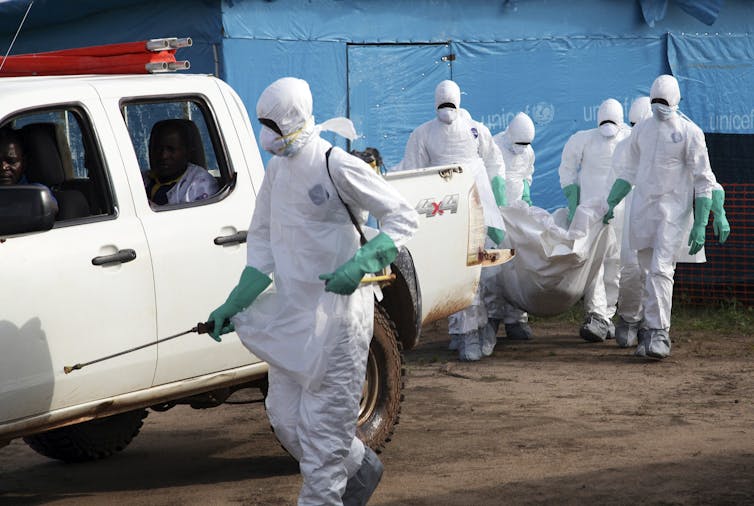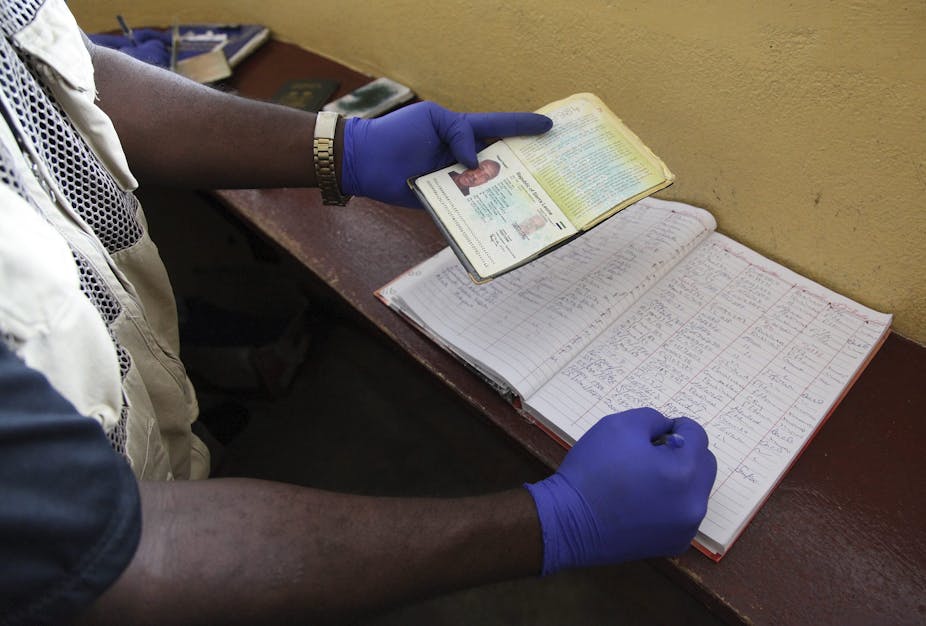The current outbreak of Ebola in West Africa is now the largest recorded since the virus was first described in 1976. That this outbreak is not under control after more than four months is cause for great concern, as are the way the virus is spreading and apparent breaches in infection control.
The epidemic was recognised at the outset as being unusual. It started in a region that borders Guinea, Sierra Leone and Liberia, far from where previous outbreaks had been reported. And cases spread early to a number of areas in all three countries.
New cases reported in recent weeks are causing already limited resources and health-care workers to be more thinly spread, but the tenacity of local health-care workers coupled with international support will hopefully see the end of the outbreak sooner rather than later.
Some reasons for concern
A recent development that is cause for most concern is the identification of a person who died in Lagos, Nigeria, after flying in from Liberia. The spread of Ebola to this major city of over 20 million people would represent a significant event if other cases emerge.
The case highlights the danger posed by the virus’ 21-day incubation period, which makes border screening unlikely to be effective. The futility of this measure is exacerbated by the fact that early symptoms and signs are similar to other common infections, such as malaria. This is also illustrated by reports of suspected cases in Hong Kong and the United Kingdom that have turned out to be false alarms.
Also worrying are reports of health-care workers becoming infected, and the death of a doctor.
In an Ebola outbreak, three groups of people are typically most at risk – the family and other household contacts of the patient, health-care workers, and funeral attendants and others who deal with the bodies of the dead.
A key measure to reduce the virus’ spread is to remove infected people from their families (because ongoing exposure could endanger others) to treatment centres where further measures to prevent spread can be implemented. Infection of health-care workers suggests these preventive measures may not be as tight as they should be.
Another reason for concern is that new cases have appeared unconnected to previous ones. Because Ebola is only spread by close contact, a key intervention is to identify the chains of transmission. Cases that present to hospitals usually represent a series of unidentified infections that need to be followed up.
Finally, there are reports of mistrust of authorities and misinformation that may be hampering an effective response. Although it’s difficult to tell how widespread these problems are, there have been reports of health-care workers being prevented from entering villages by armed men and attacks on treatment centres.

Infected patients are also reportedly being removed by force from treatment centres. Some families are said to be hiding sick relatives and seeking help from traditional healers. While this is completely understandable on one level for those involved, it also represents an ongoing risk of the virus spreading.
Some reasons for hope
But there are also some positive signs. Because the incubation period (the delay between contact and becoming unwell) is up to 21 days, current infections represent the state of control measures over that period. So the results of more recent control efforts are yet to be reflected in case numbers.
The good news is that it does appear the outbreak is coming under control in some areas, particularly in Guinea where the first cases were reported.
Health ministers of the countries involved are coordinating efforts so there’s clearly recognition of the seriousness of the situation. And the international community is pitching in with support from the World Health Organization and many non-government organisations that have experience in dealing with previous outbreaks, such as the Red Cross and Médecins Sans Frontières (MSF).
While there’s no specific treatment for Ebola infection, supportive treatment such as intravenous fluids and treatment of symptoms do help. The mortality rates reported early during outbreaks are almost always an underestimate, as reported deaths lag behind reported cases.
In previous Ebola outbreaks, between 50% and 60% of infected people survived, and these survivors may be protected against further infection. MSF has reported that the mortality of patients in their Guinea treatment centres is as low as 25%, compared to 56% for the outbreak as a whole.
Ebola is not as easily transmitted as some other infectious diseases, such as SARS, because it is not spread primarily by the respiratory route. In the first 1976 Ebola outbreak, only 20% of household contacts, where measures to prevent infection are presumably weakest, were estimated to be infected.
Identification of every single case may not be necessary. Studies suggest the average number of secondary cases that result from a patient with Ebola (known as the “reproduction ratio”) is less than three. If this ratio can be reduced to less than one (by identifying and isolating more than two thirds of the cases), then the epidemic will peter out.
Most of all, kudos should be given to the heroic efforts of those on the ground, mostly local health workers supported by a smaller number of international staff.
Several of them have reportedly been infected. People like them, who carry on this work in the face of uncomfortable protective equipment, the danger to their own lives and, in some places, the hostility of the population at risk, all deserve our respect and support.

